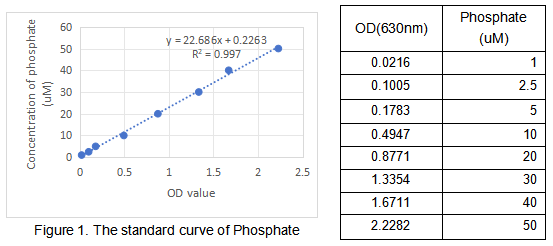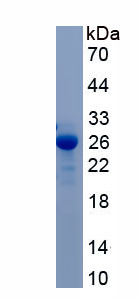Active RAB7A, Member RAS Oncogene Family (RAB7A) 

RAB7; Ras-related protein Rab-7a
- UOM
- FOB US$ 340.00 US$ 850.00 US$ 1,700.00 US$ 5,100.00 US$ 12,750.00
- Quantity
Overview
Properties
- Product No.APK300Hu61
- Organism SpeciesHomo sapiens (Human) Same name, Different species.
- ApplicationsCell culture; Activity Assays.
Research use only - DownloadInstruction Manual
- CategoryTumor immunity
- Buffer FormulationPBS, pH7.4, containing 5% Trehalose.
- Traits Freeze-dried powder, Purity > 90%
- Isoelectric Point6.6
Sign into your account
Share a new citation as an author
Upload your experimental result
Review

Contact us
Please fill in the blank.
Activity test

RAB7A is a ubiquitous small GTPase, which controls transport to late endocytic compartments. Silencing or overexpression of wild type RAB7A changed the soluble/insoluble rate of peripherin indicating that RAB7A is important for peripherin organization and function. Besides, disease-causing RAB7A mutant proteins bind more strongly to peripherin and their expression causes a significant increase in the amount of soluble peripherin. The altered interaction between disease-causing RAB7A mutants and peripherin could play an important role in CMT2B neuropathy. The activity of recombinant human RAB7A was measured by its ability to hydrolyze the substrate GTP to phosphate which was detected by the malachite green phosphate detection Kit (Beyotime # S0196M). The reaction was performed in the assay buffer 20 mM tris, 200 mM NaCl and 10% glycerol, pH 7.5, initiated by addition 100 μL of various concentrations of RAB7A (diluted by assay buffer) to 100 µL of 50 uM GTP. The final well serves as a negative control with no RAB7A, replaced with 100 μL assay buffer. Incubated at 37℃ for 5min, then add 70 ul phosphate detection agent and incubated at room temperature for 30min, read at a wavelength of 630 nm. The specific activity of recombinant human RAB7A is > 13000 pmol/min/µg.
Usage
Reconstitute in 10mM PBS (pH7.4) to a concentration of 0.1-1.0 mg/mL. Do not vortex.
Storage
Avoid repeated freeze/thaw cycles. Store at 2-8°C for one month. Aliquot and store at -80°C for 12 months.
Stability
The thermal stability is described by the loss rate. The loss rate was determined by accelerated thermal degradation test, that is, incubate the protein at 37°C for 48h, and no obvious degradation and precipitation were observed. The loss rate is less than 5% within the expiration date under appropriate storage condition.
Increment services
-
 BCA Protein Quantification Kit
BCA Protein Quantification Kit
-
 Molecular Mass Marker for Protein
Molecular Mass Marker for Protein
-
 Monoclonal Antibody Customized Service
Monoclonal Antibody Customized Service
-
 Polyclonal Antibody Customized Service
Polyclonal Antibody Customized Service
-
 Protein Activity Test Experiment Service
Protein Activity Test Experiment Service
-
 Electrophoretic Mobility Shift Assay (EMSA) Experiment Service
Electrophoretic Mobility Shift Assay (EMSA) Experiment Service
-
 Buffer
Buffer
-
 Lentivirus Packaging Experiment Service
Lentivirus Packaging Experiment Service
-
 Adenovirus Packaging Experiment Service
Adenovirus Packaging Experiment Service
-
 Real Time PCR Experimental Service
Real Time PCR Experimental Service
-
 Spike RBD Protein (S-RBD)
Spike RBD Protein (S-RBD)
-
 Protein G
Protein G
-
 Protein A
Protein A







